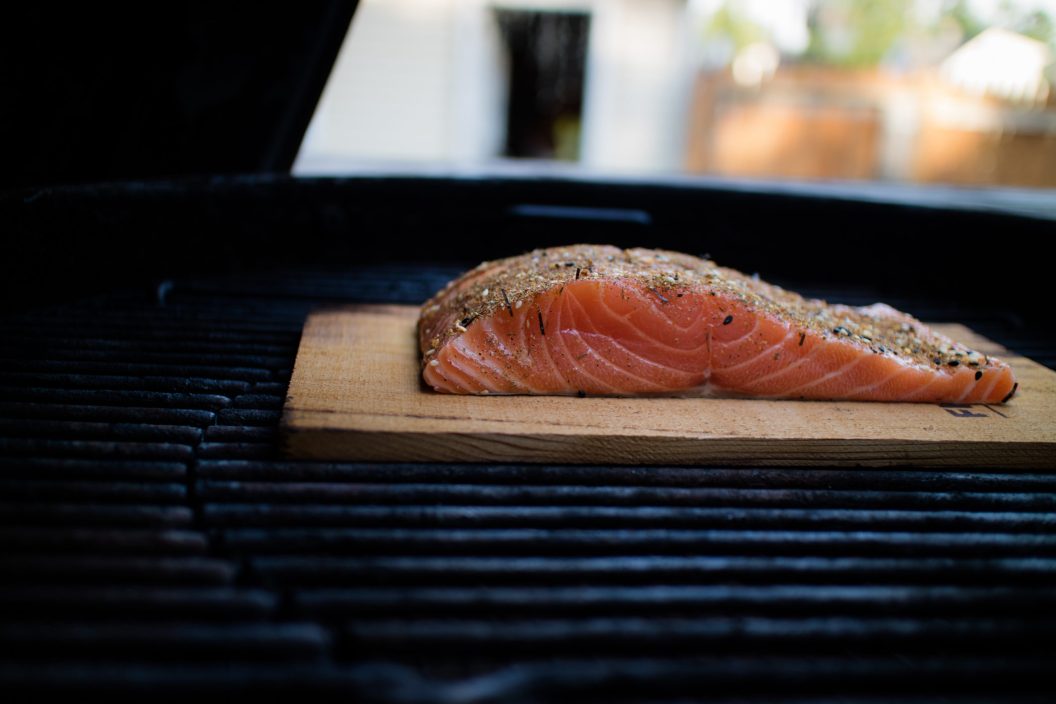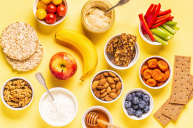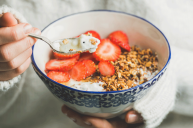This isn't groundbreaking news, but you are what you eat. It's really true. No, eating a handful of peanuts won't turn you into a peanut. Think about how you feel after eating, say, fast food. If your answer is anything other than "sluggish" or "laden with regret" we commend you. For most, eating unhealthy foods instantly changes one's mood.
On top of food-based mood swings, many studies prove, for lack of a better word, that seasonal depression is real. Luckily, the opposite is true of food. That is to say, "You are what you eat" doesn't need to have a negative connotation. You can eat smartly in order to boost your mood, especially if you experience seasonal affective disorder. With that in mind, here are 9 foods that help fight seasonal depression.
What is Seasonal Affective Disorder?
https://www.instagram.com/p/BdLoMEhHLgh/?tagged=seasonalaffectivedisorder
Seasonal affective disorder, or SAD, is a type of depression that correlates with the change in seasons. Many refer to these cold doldrums or depressive episodes as the winter blues, but it can occur during any seasonal shift: from spring to summer, or late fall to early winter. Serotonin levels drop and melatonin levels can decrease, meaning a seasonal pattern of restless days and sleepless nights. The low levels of bright light from sunshine and Vitamin D don't have to be the worst part of the year, however. Light therapy is a common solution for many, especially on extremely cold days.
In some, major depression and loss of interest is a concern during the winter months, while others might experience a spike in melancholy and sad symptoms due to low serotonin production. The foods that follow are great sources of the things your body and brain need to stay alert, productive, and content while fighting symptoms of sad. While not all mood disorders can result in weight gain, it's best to be mindful of your mental health state as opposed to your physical body when changing your diet.
1. Honey
2. Greek Yogurt
Calcium is good for you. There's no denying the healthy attributes that are, well, attributed to ingesting enough calcium. When your calcium dips below ideal levels, you may experience irritability, anxiety, impaired memory, or flat-out depression symptoms.
That said, Greek yogurt is packed with more calcium than standard yogurt varieties as well as milk. Pair Greek yogurt's high calcium levels with its equally high lean protein content and you've got yourself an incredibly powerful, nutrient-dense food. Sub in yogurt for cream or sour cream in your favorite comfort foods to add an extra healthy boost.
Start off you're day right with this gorgeous Granola & Greek Yogurt Bowl from Jar of Lemons to help fight off any form of depression.
3. Asparagus
What would a healthy diet be without asparagus? While hangovers in older adults isn't the same as seasonal depression, they can make you unhappy. That said, asparagus contains enzymes that aid in the breakdown of alcohol in your system. While we haven't tested it ourselves, you may want to see if eating a little asparagus helps you keep your hangover at bay.
Further, asparagus contains plenty of tryptophan and folate. Roughly 50 percent of people affected by depression symptoms have low folate levels. Further, tryptophan helps our body to create serotonin. Serotonin, as you probably know, is a brain chemical that helps regulate your mood in a good way, keeping your mental health strong.
Check out this simple side dish recipe for Grilled Asparagus with Lemon Zest from Joyful Healthy Eats.
4. Salmon
Foods with high levels of omega-3 fatty acids can help your body's energy production as well as maintain healthy circulation. On top of that, this essential fatty acid has been linked to improved memory and healthy brain function. With more energy and a healthier brain, your body will be more equipped to fight seasonal depression.
Brought to you by Ali from Gimme Some Oven, this Baked Salmon recipe is so simple and on top of that, helps fight seasonal depression.
5. Kale
Packed with copper, potassium, phosphorus, and iron, kale is king when it comes to nutrient-dense greens. While kale will help you achieve enough energy to beat the blues, pairing it with other greens can take your health to the next level.
Spinach and Swiss chard are both rich in magnesium, which has been shown to be beneficial while fighting depression. The best part about each is that they are easy additions to most meals, especially those with complex carbohydrates, like casseroles and pasta.
Feeling the side effects from seasonal depression? Snack on these Baked Parmesan Kale Chips from Skinny Taste when you're feeling down.
6. Mussels
Vitamin B12 is incredibly sought-after for good reasons. In addition to helping enhance your energy levels, it helps protect your brain. It does this by preserving the myelin sheath responsible for insulating your brain cells. Thus, getting enough B12 helps your brain to function properly. If you hadn't guessed yet, mussels are teeming with vitamin B12.
Beyond B12, mussels are also rich in selenium, zinc, and iodine. Selenium and iodine aren't incredibly easy to come across in food sources but they, along with zinc, help your thyroid stay healthy. A healthy thyroid means a well-regulated mood.
Get outside by the grill, take in the natural light from the sun and try out these Smoky and Sweet Grilled Mussels from The Two Bananas.
7. Lamb
Before we talk about the important stuff, we just want to note that lamb is delicious. Getting a healthy cut of grass-fed lamb and preparing it, say, as yogurt-marinated lamb kebabs is a great idea. Not only does it taste good, but it's also chock full of CLA. CLA is short for conjugated linoleic acid, and it can help lower your stress hormone levels.
Check out this recipe for Greek Lamb Chops from Cafe Delites if you have depression symptoms.
8. Dark Chocolate
Dark chocolate consumption has been shown to be good for your heart. Beyond heart health, it can also reduce cortisol levels. Cortisol and stress go hand-in-hand, making dark chocolate both delicious and incredibly useful. If you're like us, you'll reach for a bar of 85 percent or 99 percent dark chocolate. (Trust us, the dark stuff is good.)
This Superfood Chocolate Bark from Choosing Chia is one you don't want to miss if you suffer from symptoms of seasonal affective disorder.
9. Almond Butter
Almonds, along with the aforementioned dark leafy greens, contain a lot of magnesium. Again, magnesium helps fight seasonal depression and also aids in your body's conversion of sugar into energy.
The fiber in almonds and, thus, almond butter plays a key role in regulating blood sugar levels. Sure, a handful of almonds will do the trick, but we prefer almond butter on our path to a better mood.
Whether you're suffering from winter depression or summer depression, start off your day with this Banana Almond Butter Smoothie from Eating Bird Food.
This post was originally published on December 18, 2018.




